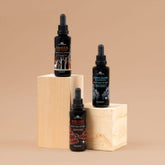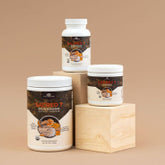
What is Cordyceps Mushroom?
Cordyceps is one of the most fabled medicinal mushrooms, and its history of use is colorful. There are old tales of Tibetan herders who noticed their livestock were stronger, more exuberant, and more reproductively sound during the time of year when they grazed on cordyceps. These native Tibetans began using it for themselves and noticed similar effects. They would put it in hot milk or water to create a tonic. Cordyceps stromas (the body of the mushroom) were even given as gifts by Tibetans. The native folk healers used cordyceps for the treatment of a total of 21 different ailments (1). This is a great reference about the traditional use of cordyceps.


They supplement with cordyceps to make a high-altitude trudge look easy.
So what is cordyceps? Cordyceps bodies are fairly small, almost resembling a chili pepper, except dark orange, brown, or even black. And the hearsay is true - it is a parasitic fungus and it does overtake a host insect’s (usually a caterpillar) body and grow out of it in a very alien way! This happens only at high altitudes under a number of other special conditions.

It is possible to cultivate cordyceps without a host insect from which to grow out of. Naturealm’s cordyceps are actually vegan, and grown on rice. Cordyceps can also be grown on a mix of substrates including insect protein powder.
There are around 400 different identified species of cordyceps. The two main species which are used for nutritional supplementation are militaris and sinensis. We don’t know every difference between the two, nor all the ways they affect the body differently, but for all intents and purposes they are similar and can be used interchangeably.
One study found that militaris had higher amounts of cordycepin and exopolysaccharides (EPS) than sinensis (2). This may lead to militaris being the superior species of cordyceps for performance, but the overall picture is likely much more complex than the amounts of just two compounds. A rich spectrum of amino acids, peptides, polysaccharides, nucleotides, fatty acids, vitamins, and minerals have all been identified in cordyceps!

In the mid 1990’s there was speculation that supplementing with cordyceps helped propel Chinese athletes including Wang Junxia and others to crush a number of world records for distance running. Unfortunately the role of the cordyceps in setting those records became unclear as the coach of those athletes, Ma Junren, became known for forcibly doping his athletes. He stated that the incredible abilities of his athletes were due in part to turtle’s blood and caterpillar mushroom, but that was likely an alibi to cover up the doping.

Wang at the 1996 Summer Olympics in Atlanta
So does cordyceps actually improve athletic performance?
There are many different conclusions.
This paper's title clearly states that supplementation does not improve exercise performance. However, upon digging in, the paper still says that cordyceps sinensis has been shown to have a blood pressure lowering effect and an effect on hepatic energy balance (3).
The latter is consistent with this study, which also concluded that cordyceps cicadae, a different species, could be useful in combating kidney disease.
The former paper also mentions that cordyceps appeared to lower plasma triglycerides and cholesterol, as well as improving glucose disposal, both huge positives for overall health, if not for exercise performance. Effective glucose disposal can help increase insulin sensitivity, regulate blood sugar, and ultimately fight things like diabetes and obesity.
In spite of the paper's dismissive title, it does agree that the findings suggest cordyceps did influence cardiovascular and metabolic systems; the effects just didn't necessarily point to any improvement in athletic performance.

This is a detailed, wide-ranging study. The sample size was relatively small, but it reasons that higher doses of cordyceps militaris (over 4g per day) over longer periods of time (weeks) may lead to those elusive exercise performance benefits. Neither we nor they are recommending that as a dose, and the study states that future studies should be seeking an acceptable dose for the desired benefits.
This study was conducted over 12 weeks and found that cordyceps improved exercise performance and may promote wellness in healthy older adults.
Cordyceps also improved skeletal muscle in rats as evidenced here. It interestingly concludes that cordyceps improves endurance capacity with or without exercise, and it called cordyceps a potent exercise “mimetic”. Does cordyceps give the benefits of exercise in supplement form? Probably not entirely, but it’s interesting to consider the possibility of being able to improve certain systems without exercise.
Another study was done with humans at the Beijing Medical University Sports Research Institute. This study found cordyceps helped buffer lactic acid, thereby increasing anaerobic performance. Cordyceps could improve the body's capacity for strength training in this manner.
Cordyceps and its associated compounds show much more benefit than just exercise performance. Cordyceps is also a potent antioxidant as declared here.
This powerful antioxidant effect may also carry over into helping memory impairment as seen here.
Looking more at cordyceps and mental health, cordyceps had an antidepressant-like effect on mice who were subjected to mild chronic stress in this study. Perhaps it may work like other adaptogenic herbs in terms of promoting a healthy stress response and a general sense of well-being.

Many people look to herbs and alternative medicine for sexual dysfunction. This paper claims that cordyceps may be a healthy natural alternative to Viagra. It cites three different Chinese studies, all double-blind, placebo-controlled, with over 200 men who suffered from various sexual dysfunctions. 64% of the men who were given cordyceps reported significant improvements in their conditions at the end of the study, compared to only 24% of the men who were given the placebo. There was a similar, albeit smaller, study with women, and 90% reported improvements. The paper suggests vasodilation and enhanced blood flow are the main mechanisms for the success in these studies.
Cordyceps may also increase testosterone. This study found a significant stimulation of testosterone production in mice, and says that the results may apply to the treatment of problems caused by low testosterone in human males.

Cordyceps mushrooms are a beautiful representation of form follows function in the natural environment. They typically grow at high altitudes where oxygen is very scarce. In such a harsh environment, all forms of life must create adaptations in order to survive. The compounds in cordyceps could represent a byproduct of the ways in which the organism copes with its harsh environment.
Is it a coincidence that compounds in cordyceps may have a host of incredible effects on biological systems when those effects are exactly what’s essential to survive in such a climate?
Cordyceps and its rich composition appear to have enormous pharmacological merit. It appears to, at the very least, promote wellness in a number of impressive ways.
We believe it’s well worth supplementing with, based on both its vibrant history as folk medicine and all of the continually emerging research. Its newly widespread adoption as an ergogenic aid in the West is not without good reason. But, alas, whether or not cordyceps will propel you to break any Olympic world records, the jury is still out on that one.
1. Panda AK, Swain KC. Traditional uses and medicinal potential of Cordyceps sinensis of Sikkim. J Ayurveda Integr Med. 2011;2(1):9–13. doi:10.4103/0975-9476.78183
2. Kim H.O., Yun J.W., A comparative study on the production of exopolysaccharides between two entomopathogenic fungi Cordyceps militaris and Cordyceps sinensis in submerged mycelial cultures, Journal of Applied Microbiology. 2005; Volume 99, Issue 4, Pages 728-738. https://doi.org/10.1111/j.1365-2672.2005.02682.x
3. Parcell A, et. al, Cordyceps Sinensis (CordyMax Cs-4) Supplementation Does Not Improve Endurance Exercise Performance. International Journal of Sport Nutrition and Exercise Metabolism, 2004, 14, 236-242 © 2004 Human Kinetics Publishers, Inc.


